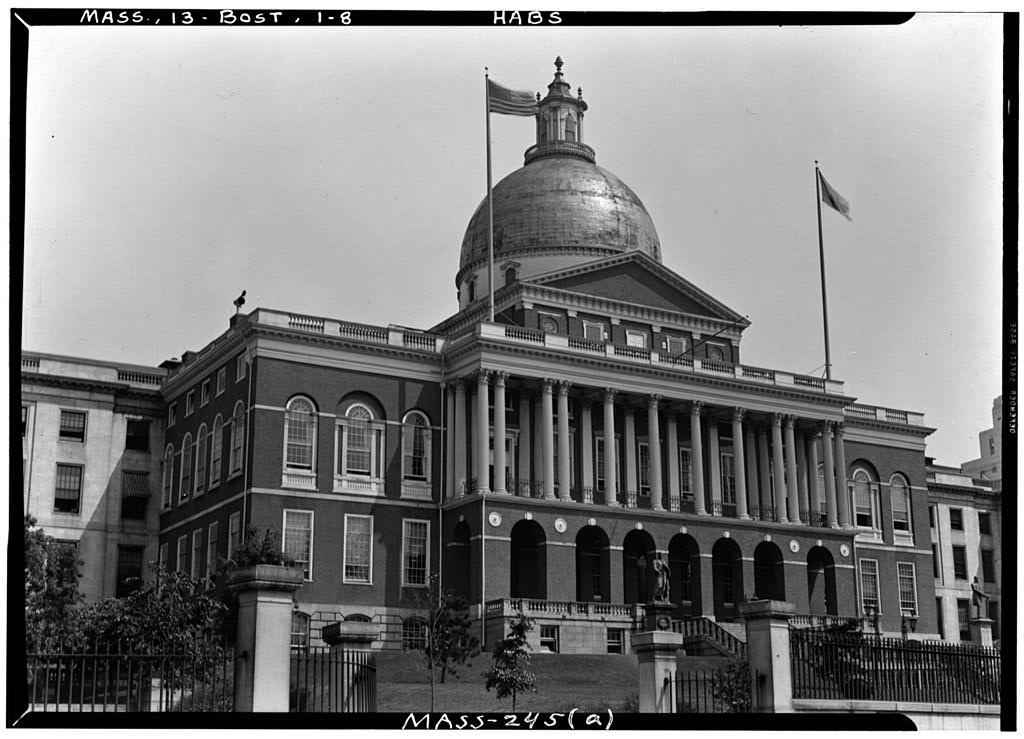Introduction
In response to British harassment and impressment of American seamen along with other actions taken by British and French combatants during the Napoleonic Wars (1803–1815), Congress enacted and President Thomas Jefferson (1743–1826) signed an Embargo Act on December 22, 1807, preventing U.S. ships from embarking from the United States to travel to foreign countries. During the next year, Congress adopted several additional laws with the intent of strengthening enforcement of the Embargo Act, culminating in passage of an Enforcement Act of January 9, 1809.
Although the effects of the Embargo Act and subsequent enforcement acts were felt all along the Atlantic Coast, opposition was especially strong in the New England states. A number of towns in New England issued petitions urging that these acts be repealed, and several state legislatures subsequently adopted resolutions condemning the acts. In Massachusetts, a joint legislative committee crafted a series of resolutions that were approved by both houses of the state legislature on February 15, 1809. A decade after the Massachusetts Legislature condemned the Virginia General Assembly for claiming that state governments were authorized “to decide upon the constitutionality of the acts of the federal government”, the Massachusetts Legislature declared various acts of the federal government to be, “in the opinion of the legislature, in many respects, unjust, oppressive and unconstitutional, and not legally binding on the citizens of this state.”
—John Dinan
On viewing these provisions of the act under consideration, the committee do unequivocally declare their solemn conviction, that it is in many particulars, unjust, oppressive, and unconstitutional. They would by no means contend that this opinion, if confirmed and adopted by the legislature, would be decisive of the question. While the laws continue to have their free course, the judicial courts are competent to decide this question, and to them every citizen, when aggrieved, ought to apply for redress. It would be derogatory to the honor of the commonwealth to presume that it is unable to protect its subjects against all violations of their rights, by peaceable and legal remedies. While this state maintains its sovereignty and independence, all the citizens can find protection against outrage and injustice in the strong arm of the state government.
Any forcible resistance, therefore, by individuals, to the execution of this act of Congress, is not only unnecessary, but would be highly inexpedient and improper; it would endanger the public peace and tranquility, and tend essentially to injure and put at hazard that cause, on which nearly the whole people are now so zealously united. The committee are deeply sensible of the accumulated distress which has so long oppressed the whole community, and borne with aggravation on some particular parts of it. They cannot too highly applaud the unexampled patience and forbearance which has been already exhibited under this pressure of undeserved calamities. And they would earnestly recommend the exercise of the same forbearance, until all those peaceable and orderly means which the Constitution and laws of our country will permit, and all those political expedients which our habits and usages can suggest, shall have been exhausted in vain.
It is to be regretted that no immediate and efficacious remedy can now be proposed for these numerous and aggravated evils. The committee, however, consider it their duty to recommend, without loss of time, all such measures as have appeared to them to be now practicable, and calculated to remove or alleviate the public distress; they therefore ask leave to
Report in part, A bill to secure the people of this commonwealth against unreasonable, arbitrary and unconstitutional searches in their dwelling houses—and also the following resolutions.
Resolved, That the act of the Congress of the United States passed on the ninth day of January in the present year, for enforcing the act laying an embargo, and the several acts supplementary thereto, is, in the opinion of the legislature, in many respects, unjust, oppressive and unconstitutional, and not legally binding on the citizens of this state. But notwithstanding this opinion, in order finally to secure a certain and permanent relief, it is earnestly recommended to all parties aggrieved by the operation of this act, to abstain from forcible resistance, and to apply for their remedy in a peaceable manner to the laws of the commonwealth.
Resolved, That a suitable remonstrance be prepared, and immediately forwarded to the Congress of the United States, from this legislature, expressing their opinions and feelings on the several subjects of complaint contained in the said petitions, and particularly urging the repeal of the said act of Congress, passed on the ninth of January last.
Resolved, That the legislature of this commonwealth will zealously cooperate with any of the other states, in all legal and constitutional measures, for procuring such amendments to the Constitution of the United States, as shall be judged necessary to obtain protection and defense for commerce, and to give to the commercial states their fair and just consideration in the government of the Union; and for affording permanent security, as well as present relief, from the oppressive measures under which they now suffer.
Resolved, That the honorable the president of the Senate, and the honorable the Speaker of the House of Representatives, be requested to transmit a copy of this report, and the resolutions thereon, to the legislatures of such of our sister states, as manifest a disposition to concur with us in measures to rescue our common country from impending ruin, and to preserve inviolate the union of the states.




































































































































































































































![Finley, A. (1829) Pennsylvania. Philada. [Map] Retrieved from the Library of Congress, https://www.loc.gov/item/98688548/.](/content/uploads/2024/02/Map-of-PA--273x190.jpg)



































































































































































































